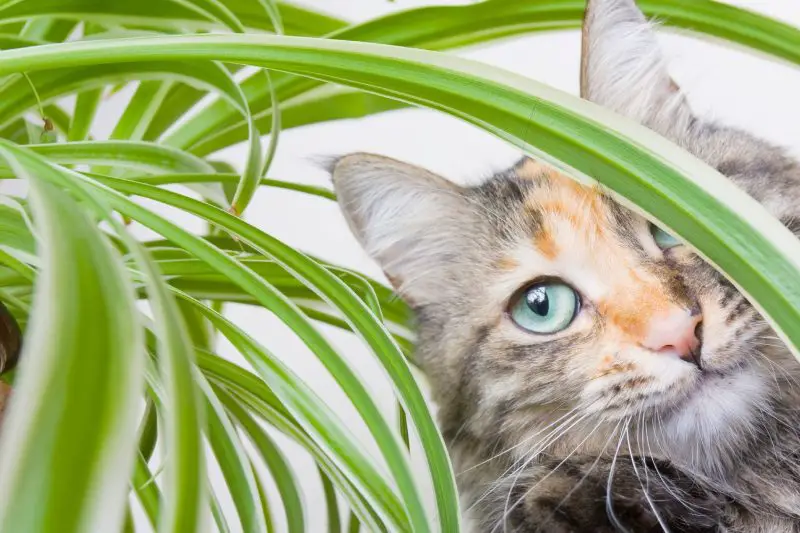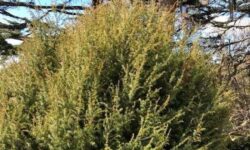Spider plants are among the most popular houseplants, loved for their easy care, air-purifying abilities, and long, arching leaves that look elegant in any indoor space. But for cat owners, one question often arises: Are spider plants toxic to cats or safe for your feline friend? With many houseplants posing potential risks to pets, it’s important to understand whether keeping a spider plant at home could harm your beloved cat.
In this guide, you’ll find everything you need to know about spider plants and their effects on cats, including their level of toxicity, why cats are so attracted to them, and how to keep both your plants and your pets safe. This information will help you make an informed decision about whether spider plants are suitable for a cat-friendly home.
Table of Contents
Understanding Spider Plants and Their Appeal

Spider plants, scientifically known as Chlorophytum comosum, are hardy indoor plants native to tropical and southern Africa. They are well-loved for their attractive, arching green leaves with white or cream stripes and their ability to thrive in low-maintenance conditions. Often grown in hanging baskets, spider plants produce baby plantlets, or “spiderettes,” that dangle gracefully, making them visually appealing.
What makes spider plants particularly interesting to cat owners is their strong resemblance to grass. Cats are instinctively drawn to grass-like plants because, in nature, they chew on grass to aid digestion, stimulate vomiting of hairballs, or simply for entertainment. The long, slender leaves of spider plants mimic the texture of grass, which is why many cats find them irresistible.
Are Spider Plants Toxic to Cats?
The good news is that spider plants are not considered toxic to cats. According to the American Society for the Prevention of Cruelty to Animals (ASPCA), spider plants are classified as non-toxic to both cats and dogs. This means that if your feline friend nibbles on a few leaves, it is unlikely to cause serious poisoning or long-term health problems.
However, “non-toxic” does not necessarily mean completely safe. While spider plants are not poisonous, excessive chewing or ingestion can sometimes lead to mild digestive upset. This is mainly due to the plant’s fibrous leaves, which can be difficult for a cat’s stomach to process. In some cases, cats that eat too much of the plant may experience vomiting or diarrhea, although these symptoms are typically mild and short-lived.
Why Are Cats Attracted to Spider Plants?
Cats are naturally curious creatures, and their fascination with spider plants goes beyond the simple need to chew on greenery. Researchers believe that spider plants contain mild hallucinogenic properties, similar to catnip. While they do not contain nepetalactone—the active compound in catnip—spider plants are thought to produce other chemical compounds that may mildly stimulate a cat’s senses.
When cats interact with spider plants, they often exhibit playful behaviors, rolling around the pot or pawing at the long, dangling leaves. The movement of the leaves when touched adds to the fun, making spider plants a natural toy for curious cats. Unfortunately, this can sometimes lead to shredded leaves and an untidy appearance, which can frustrate plant lovers.
Potential Health Risks from Chewing Spider Plants
Even though spider plants are non-toxic, there are a few risks associated with allowing cats to chew on them excessively. The fibrous texture of the leaves can irritate a cat’s stomach, leading to mild gastrointestinal issues such as vomiting or loose stools. This reaction is not due to toxins but rather to the cat’s digestive system struggling to break down the tough plant material.
Additionally, spider plants are prone to collecting dust and may sometimes carry traces of pesticides or fertilizers if not properly maintained. If a cat ingests these substances, it could experience more serious health issues, including lethargy, excessive drooling, or more severe digestive upset. This is why keeping your plants free from chemical treatments is crucial if you have pets at home.
How to Keep Cats Safe Around Spider Plants
If you love spider plants but are worried about your cat chewing on them, there are several ways to minimize the risks while keeping both your plant and pet happy. One of the simplest methods is to place spider plants out of your cat’s reach. Hanging baskets, high shelves, or plant stands can make it more difficult for curious cats to access the leaves.
Another approach is to provide your cat with safe alternatives to chew on. Cat grass, which is usually a mix of wheat, oat, and barley grass, can satisfy your cat’s natural urge to nibble on plants. Offering catnip toys or other interactive play items can also help divert attention from your spider plants. Additionally, training your cat with gentle deterrents, such as citrus-scented sprays or double-sided tape around plant pots, can discourage unwanted chewing.
Tips for Growing Spider Plants in a Cat-Friendly Home
Spider plants are relatively easy to grow, making them perfect for homes with pets. To ensure they remain healthy and safe, it’s important to provide the right growing conditions. Spider plants thrive in bright, indirect light and prefer well-draining soil kept evenly moist but not waterlogged. Avoid using chemical fertilizers or pesticides that could harm pets if accidentally ingested.
Regularly trimming damaged or chewed leaves helps maintain the plant’s appearance and encourages new growth. Wiping the leaves with a damp cloth can also remove dust and potential allergens, making the plant safer for both humans and pets. If your cat shows persistent interest in the plant, consider rotating it to different locations periodically to reduce easy access.
What to Do If Your Cat Eats Too Much Spider Plant
If your cat chews on a spider plant occasionally, there’s usually no cause for concern. However, if your cat eats large amounts of the plant and starts showing symptoms like repeated vomiting, diarrhea, or lethargy, you should monitor its condition closely. In most cases, symptoms resolve within 24 hours as the cat’s digestive system clears out the plant material.
If the symptoms persist or worsen, consult your veterinarian for further advice. It’s helpful to bring details such as how much of the plant was eaten and whether any fertilizers or pesticides were recently used on the plant. While spider plants are generally safe, every cat reacts differently, and professional guidance is always the safest option.
Are Spider Plants Safe for Other Pets?
Spider plants are non-toxic not only to cats but also to dogs and other household pets. However, similar to cats, dogs that chew large amounts of spider plant leaves may experience mild digestive upset. Birds, on the other hand, are more sensitive to plants, so it’s best to keep spider plants out of reach of pet birds, as their delicate systems may react differently.
FAQs about Are Spider Plants Toxic to Cats
Are Spider Plants Completely Safe for Cats?
Yes, spider plants are classified as non-toxic to cats by the ASPCA. Occasional chewing is usually harmless, though excessive ingestion may cause mild stomach upset.
Why Do Cats Like Spider Plants So Much?
Cats are attracted to spider plants because their long, grass-like leaves resemble natural grass. Some researchers believe spider plants may have mild hallucinogenic effects similar to catnip, stimulating playful behavior.
What Happens If a Cat Eats Too Much Spider Plant?
If a cat eats large amounts of spider plant leaves, it may experience temporary vomiting or diarrhea. These symptoms are mild and typically go away within 24 hours without medical treatment.
Can Spider Plants Make Cats Sick?
Spider plants are not poisonous, but they can cause mild digestive irritation if consumed in excess. Cleaning the plant leaves regularly and keeping them free from fertilizers or pesticides minimizes any risk.
How Can I Stop My Cat from Chewing Spider Plants?
Placing the plant out of reach in hanging baskets, providing safe alternatives like cat grass, and using citrus-scented sprays or gentle training can discourage chewing behavior effectively.
Are Spider Plants Safe for Other Pets?
Yes, spider plants are safe for dogs and most small pets, though chewing large amounts may still cause mild stomach upset. Birds may be more sensitive, so keep the plants away from pet birds.
Final Thoughts
So, are spider plants toxic to cats or safe for your feline friend? The answer is reassuring: spider plants are non-toxic and generally safe for cats. While chewing on them may cause mild stomach upset in some cases, they are not poisonous and pose minimal risk when compared to many other houseplants. By placing spider plants out of reach, offering safe alternatives like cat grass, and keeping plants free of chemicals, you can enjoy their beauty while ensuring your furry companion stays healthy and happy.
For cat owners who love indoor greenery, spider plants remain one of the best choices for a pet-friendly home. With proper care for both your plants and pets, you can create a harmonious environment where lush, trailing foliage and curious feline friends coexist peacefully.






